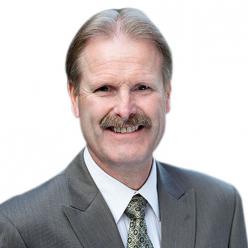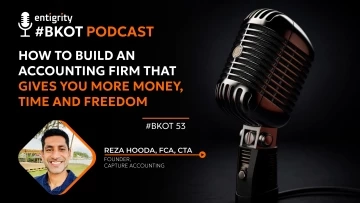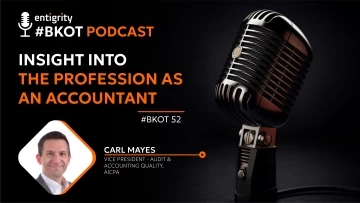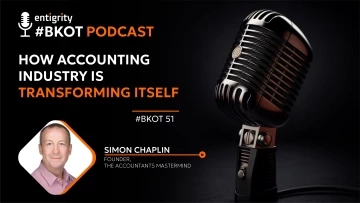In this episode, Chris spoke to Adam about how Offshore Staff gives more leverage to the virtual firms like Summit CPA and how these firms can build a distributed team that integrates together and works for higher goals.
#BKOT 04: BUILD A KICKASS OFFSHORE TEAM
HOW VIRTUAL FIRMS SHOULD LEVERAGE OFFSHORE STAFFING
Hosted by: Chris Rivera, Director Client Relations, Entigrity Offshore Staffing
Guest: Adam Hale, COO Partner, Summit CPA Group
Chris: So, Adam. Founding partner and problem solver, solver of Summit CPA. In 2001, it all started. So what was the vision at that time?
Adam: At that time, we just were looking to blaze our own path and we just didn't want to work a ton of hours during a busy season. So my partner at the time was my boss. For the first three years I worked for him and whenever he started the practice, he's just like, hey, I'm looking to still do public accounting. And instead of working 100 hours during a busy season, trying to figure out a way to annuitize the business a little bit and work, you know, normal hours all throughout the year. So that was really the plan. I mean, it was pretty self-serving. We did a lot of cutting edge stuff at the time in terms of value based billing and an ACHing clients accounts every week. You know, that kind of thing pretty early on. But it was you know, again, it was pretty selfish. It was you know, we needed the cash flow. We wanted to create the annuity. So a lot of the things that we did that are kind of commonplace now, we're a little obscure back then. And the reason was it's just again, we're just kind of trying to even things out, if you will, from a cash flow and a workload standpoint.
Chris: So essentially, what's division now are the objectives over the next to, say, three years?
Adam: Our focus right now is just continuing to try to up the game on the delivering value so early on it was all about, you know, taking the traditional right up work and spreading it out evenly throughout the year. So you didn't have that compressed busy season. But then whenever we started talking to our clients, we haven't really found ourselves to be less of CPD and more business advisors. And that's really where our passion is. And, you know, that's what, you know, in terms of quality of work and really having a passion to do things. That's where we really strive. And that's what our team looks for whenever they come and they work with us. And that's what our clients also look for. So I think just trying to always just up our game in terms of how we deliver what we deliver. So we're doing a lot with Dashboard Thing and KPI and stuff like that. There's some canned stuff out there, but it looks really cute, but it's not super functional. So we're trying to bring the functionality along with the cuteness and be able to give our clients the information they need in real time on their phone and that kind of stuff.
Chris: So while some low level technology aspect of it. So in retrospect, what would you say were some key moments that shaped the history of summer hiring?
Adam: Everything that we like, we've done a retrospective whenever we have our team retreats and we've kind of looked back through a timeline of Summit CPA and then marked all of our major milestones, whether it's financially or services we deliver in at the exact same time every single time it was a key hire. And so most of those people at this point are at our director levels. We have a really super strong leadership team. But yeah, if you look over the course of our most 20 years, it's like, hey, now we have a tax director. You know, we're not super into tax. My partner and I are really good at tax. But that wasn't where our passion was. That was a natural need for the company where we found somebody that that's all they like to do. And he's fantastic at it. David, our tax director, same thing with Ken, our audit director, you know, just kind of goes from there. So now we have people in marketing seats, you know, and accounting director and I.T. director, all the different facets of the business that we need. We've been able to make some really key hires in all those areas. That's been big for us.
Chris: That's awesome. And I've been watching a lot of your videos on YouTube and and and your talks around the CPA profession of future technology and people called the summit CPA the firm in the future. So why is that so? And what are your thoughts about it?
Adam: Well, my first thought is like we're kind of the firm of the now. You know, I mean, I appreciate the firm of the future kind of the thing. But in a lot of firms out there, we probably are you know, you go to these CPA events all over the country and they're eyes talking about, hey, in the future, you should be doing this and you should be doing that. The reality is that you should be doing it now, like we don't really know what the future holds. And we need to keep pushing the envelope for sure. But you need to kind of get caught up first so that we can, you know, progress. So for us, what future means is just always having it's more of an approach. So we're always looking for something better, innovative tools. You know, we're constantly reading and trying to to listen to what others are doing and kind of make it our own way. So that's that's the way we kind of embrace the future is just making sure that you can handle the change.
Chris: And I've been reading the blogs, too, and your mission is to change the way people think about accounting. So you guys don't even step into a client's location to do a four or one K audit, right? Yeah.
Adam: Yeah. So yeah, we do some 401K audits and that's really just about process and everything. So when we were like just reflecting a little bit on what we wanted to do and what our mission for the company was, is whenever we say change the way you know that people think about accounting, we mean our customers. You know, we want to make sure that our customers are expecting more of an advisory service out of their CPA firm, not just transactional. And then we're also talking about our team. So we want our team to kind of rethink how they and, you know, look at public accounting because we're doing this other service and then also our competitors. So we actually have started to work with other CPA firms and coaching them on delivering these CFO services. And so, like I said, it's full scope, customer team, you know, competitors. We want them all to kind of just reshape and think about how public accounting is more advisory and strategic than just transactional. And so in retrospect, building a virtual firm, I mean, had this idea come about and was something that triggered it.
Well, just yeah, we had an anchor client, actually. You know, some of it was, again, a little self-serving. We were looking to to do some marketing and advertising. And we started early on with our Web site, which not a lot of CPA firms do. It's usually more grassroots. And so we were reaching beyond our location anyway a little bit. And so my partner started Googling different things and we couldn't use C.P.A account and things like that is just too expensive. Like the word search and we've got blended in with a bunch of other people. And so that's whenever he. I don't want to say coined the term virtual C.F.O. But we were one of the very first people to use that and we marketed it heavily. So in doing so, we ended up getting a client from Rhode Island who are in Indiana is pretty far stretch shows, actually website development company. At first we thought they were just like wanting to pitch us on redoing our website. But the reality was, is they they wanted us to be the CFO for their firm and we're like all we can do that. And so we had to start developing processes around delivering our service to a client that's not located in our town. We couldn't go there anymore because a lot of people call themselves virtual CEOs or fractional CEOs and they still like have people come to their office or they go to the client's office. We couldn't do that whenever they're in Rhode Island. And then just by happenstance, they started referring some of their competitors to us so that we could kind of up our game and their space and understand them a little bit better. And we got more and more clients that were outside of our area and it just kind of took off from there. And so not only did we decide after a little while, hell, if we can do this with our clients, why can't we do this with our team? And we were outgrowing our current space. There's a big, huge story around that, too. But when we got to the point where we had to do a build out because we are growing so fast and. And we realized, hey, we need to make sure that we're able to to reach outside of our geographic location. If our clients are going to be everywhere, no reason why we can't be so.
Chris: And now let's talk more about offshoring. Have you. Did you try offshoring at all in the past or explore?
Adam: Oh, yeah, we've done it multiple times. So I would say pretty, you know, back in 2010, I'm going to mess up the air. But it was like 2009, 2010 offshoring was becoming a pretty hot thing, especially with a lot of the big four. It was it was a huge thing is primarily driven around tax, though, at the time. And so we dipped our toes into that. We didn't have great success with it. The reason being is I think that we weren't able to communicate with the team. It was kind of a little bit of a black box. And as long as stuff was like super. As long as it was like just really paint by numbers, they were OK. But if it required any kind of outside thinking, it was like it would get lost in translation. We didn't have the opportunity to self-correct, so it didn't take long before we just punted on undoing the tax work and brought that back in-house. A couple of years after that, I'd say back in 2016 or 17, we ran into an individual that provided offshore bookkeeping and we wanted to give it a shot again. What we found internally is that our bookkeeping team, because they were able to communicate with our the rest of our team so easily, we didn't have really super solid processes. So we weren't able to force them into a process because they could, you know, interact all day long. Hey, do this. Do that. Don't forget this. You know, that kind of thing. Really, whenever you grow, that becomes problematic. You really need a lot of strong process on the back end in order to successfully do bookkeeping services within your within your practice. And so anyway, that we started working with this this other company for a while and it and it made us develop the processes and everything. The only problem is it wasn't as scalable as we would like it to been and it wasn't in the quality of work would sometimes kind of fall off. So the process was good, but everything else was a little bit a little bit off. And so we were kind of looking around for four potential other opportunities. And that's whenever I saw you in New York.
Chris: And yeah, and that that started this whole process. That kind of was the trigger point. So do you hire them for a temporary or permanent? And then kind of what were the qualifications experience you were seeking in the beginning?
Adam: Yeah, well well, just to back that up a little bit. What I really liked about your presentation was your approach. What I think makes you all a little bit different is I really like the idea and the mentality that your remote and not offshore necessarily. So it just happens to be you're in a different country. But again, our teams all over the United States. So it's pretty seamless transition as far as that stuff goes. And the fact that your team doesn't work in a black box, we have a virtual office. Your team hasn't you know, they all have office space within our virtual office. They come in and they are able to hang out with our team until like 1:00 p.m. Eastern. Big difference. So we're able to implement the process, still have the touch, you know, all that kind of stuff. So that's really what intrigued me most about the service. So, you know, we kind of went into it a little bit and I think we started off with a few temporary folks. But even the permanent on your side isn't like a huge commitment. So I think we might have actually went with permanent right out of the gate whenever we started with just a few people. And the other thing that I thought was, was great. Not only was this person coming into our office and being able to communicate with the team, but we were able to interview the person. So we were able to kind of call out, hey, we want somebody that's QBO certified or XERO certified some just use bill.com. You know, we could ask him some accounting questions. We could make sure that there wasn't a big language barrier because obviously there's accents and everything else. You know, anytime you're dealing with somebody from from a different country that has a different language, but you're able to communicate with them and just make sure that that. That we were comfortable with how that was going to work and it was super successful. And, you know, in a pretty short amount of time. So we've kind of grown from there. So we went from trying it out with one or two people to quickly scaling to like 12 or 14 in a short amount of time.
Chris: And so, yeah, well, you've grown pretty quickly without everything's gone pretty good so far, and so right now, how do you structured your onshore and offshore team and how you ensure the integration is seamless?
Adam: Yeah. So for us, what we found to be successful was whenever it comes to again, we use the team for a lot of the back office stuff. They can handle anything that an onshore team can handle from a back office standpoint. Our team is really focused on the advisory piece. And then also but in order to be a good adviser, it's garbage in, garbage out. So you have to make sure that that back in stuff's clean, which is the reason why clients look for us to do it and oversee it. Well, we've been able to do is we use a software called Jetpack, and that's basically where all of our standard operating procedures lie. So we have videos and all these kind of things. Your team's familiar with Jetpack. We have some that have used it in the past and they come right in. They're able to check off all the tasks. Watch the videos, understand how to do things. And they're very methodical. They're also kind of left alone from all the client traffic, which is what we want. You know, that's what we'd want from any bookkeeping team. If you want to kind of like get them out of the traffic of all the e mails or slacks or conversations from the client so they can do the heads down work. So that team comes in and they have a very defined set of tasks. They have videos where they can go to. And then they meet with their individual person that's assigned to them in order to just check in for the day, see if they had any blockers, talk through things, make sure that everything's going in. And sometimes just reshuffle the deck for the next day. Hey, let's move some things around. Priorities have changed. You know, those kind of things. So we found it best to have almost come of that one to one relationship. And it also gives us the ability to, like, scale into each one of those folks, too. So we might need 10 or 20 hours from each one of them initially. And then as our team’s books grows, we're able to just keep filling those same people up.
Chris: So when you were when you were hiring, do you think you prefer to hire, you know, one step at a time or, you know, hire a bunch of the time or. What are your thoughts on that? Yeah.
Adam: So initially it was just more of like. Testing the theory and making sure it was good. And then once we had an experience with one or two people that we really liked from your team, they joined. And and we're able to do really well. Then it was we could scale pretty fast because we had the system in place. So that's why Jetpack was so important. So we already had all the S.O.P. Spilt out. We just needed somebody to take them over. And once we were able to see that, your team could come in and just knock it out really quick and and succeed in that kind of a model, then it was more of like I think you recall we turned the floodgates on. We were just like, hey, we need to interview people right now. We need to see what's going on. You know, let's let's get as many folks as we can on. So. So I would start out slow. And then if you have the process built, then then bring more on faster in order to really get things going. But what's also cool is that they were also able to help us fill out our standard procedures to or modify them whenever we needed because they had experience with jetpack and project management tools to understand what we're trying to do and accomplish. So that was a that was a little bit of a time saver for us as well, where we had some gaps.
Chris: So now being completely remote for 80 percent of clients being outside where you're headquartered. Have you seen some point of difference between I'm the low south or the offshore team in terms of the task they could before the qualification and experience even work culture now?
Adam: I mean, they have a they have a little bit of an accent and they work in our office to 1:00 p.m.. Other than that, you wouldn't know India from Indiana. You know, in terms like if you were doing if we were doing the bookkeeping stuff, like I said, our team our team has a focus of the advisory stuff. So knowing that that's the bookkeeping items and tasks and clean up in the accounting files are being done systematically every single day without fail is huge because what ends up happening for our team internally is a client calls up, there's a fire. You have to put down what you're doing, go to the fire and then you come back and it's like you don't want to find out that, like the bank didn't get wrecked or we don't know where cashflow is or, you know, because then that just creates this big, huge problem down downstream, you know, later in the week, having those repeatable tasks taken care of without fail every week and every day is huge. So, no, we haven't noticed a difference in terms of that. Like I said there in our virtual office with us where we're talking and hanging out. So it's been great.
Chris: So when you have such a big team, did the dog come across about what? What anyone will think about hiring off shore staff as far as language barriers or timezone differences or anything like that?
Adam: Oh, yeah. I mean, that's a stigma all in its own right. You know, and I would say it with the team and I think this was I think this is how we overcame it. And one of the reasons, again, that we were attracted to you all is that it's a remote hire. It's not an offshore hire. They just happen to live in India. Like if they lived in London or Tokyo or we have our team that lives in the states that we had one that lived in Germany for six months. You know, they're able to do that. So the difference is, is that instead of being in a black box where things just get thrown to and they get done and they come back to us. Like the fact that we actually have a person assigned to us and we can talk to that person and just, you know, they're educating us on their culture. And it's really cool. It's like a it's a cool learning experience for us as well. You know, we're learning about their holidays, their traditions, those kind of things. So that goes away whenever you're able to have those conversations with people. They really just kind of brings a human element to it.
Chris: Yeah. You guys I mean, some it's 100 percent virtual accounting firm. So can you talk about some of the pros and cons of being virtual office to say which outweighs the other?
Adam: Yeah, without a question, I mean, being distributed is one of the best things that we ever did. You know, the nice thing about being virtual is you get access to talent all over the country and now all over the world. Right. That you might not otherwise have access to. So instead of having to worry about finding specific talent in a small geographic footprint, now we can go everywhere. We can also go everywhere with our vertical so we can have a couple of verticals and work with different clients all over the country as well. There's definitely. And then I'd say even from a culture perspective, some people are you know, we talk about this a lot. You have to work harder if you're distributed in order to have a strong culture. We measure culture on a monthly basis. We talk to the team about it. We really work hard on our core values. We make sure everybody on the teams live in them out all the time. And I think we have in this is just the feedback from the team and even people that have left for other opportunities. They've always said like the number one attribute is culture. Summit, like the team is very supportive. We hire great people. You just have to work a little harder at it, that's all. And I think that's why we're probably better than most brick and mortars is because we have to have a deliberate effort to create culture as opposed to just letting that happen.
Chris: You also said he plans on visiting the India office. Maybe the offshore team.
Adam: Yeah, that'd be awesome. You know, we've seen the videos and everything on online and everything. It'd be cool to to make the journey one of these days and go check out the team. We're actually working with you right now on getting the team to come over to the US. So looking forward to that. Every year we do a team retreat. This year, it's going to be in Vegas, which is going to be nice. And may we pull the whole team together again? It's part of this culture thing that we were talking about. You know, we're able to work out some efficiencies and and get the team updated on everything. But the other side of of having a team retreat is just getting the team in person face to face once a year. Just to add to the relationship. So it's a really great time for us to work through a lot of different things. And so we look forward to having the the team from India come and visit the United States and hang out with us and work through some of the efficiency stuff, because a lot of it applies to them and their process. So we'd like to hear from them on how we can make things better and and work through things. And it should be should be a great time. Yeah, I know. Some pretty significant for you guys. So we appreciate it. Unbolt them then. You know, big a mid-size firm. What would you given by the small and mid-sized accounting firms? What's your advice on it's got this process and everything? Well, we've always had just the junk first mentality with everything. I mean, you know, yes, whenever you were talking earlier, firm of the future, it's just you know, it's just taken a lot of swings, that stuff. And because you never know. Perfections, your worst enemy. So you just sometimes have to dive in, create the process. Be willing to be agile with, you know, shaping things. And so my advice would be just to reach out. Interview some folks. See if you can find a good fit. You know, make sure that you have the structure in place and just know that it's going to have to be fixed. So once you get moving around, you've got to give it a little time to to, you know, again, be just agile and shift things around a little bit. But once you find a good comfort zone, then, you know, make sure that you just leverage, you know, as much as possible. That's how we've kind of built our firm. It's just leveraging as much as possible to bring the costs down to our clients and focus on the most value added stuff we can.
Chris: All right. So winding down here, some rapid fire questions. What are the top five apps that you suggest for virtual working? Top five apps?
Adam: Wow. SoCoco is our virtual office. We would get lost without them. Slack, which integrates with SoCoco is great then as far as like accounting software and things of that. Well, Calendly is amazing. So calendly, you know, allowing your clients to be able to schedule whenever they need to. That's great. And then, of course, I'll just give you a zoom, slack, goto meeting. I prefer zoom, but goto meeting zoom are both essential. And then as far as like accounting software goes, I won't say QuickBooks versus Xero I’d say bill.com. So we pay bills for clients and if we didn't have a bill.com, we wouldn't have the ability to push out a lot of their bills because we're not going to run around with their checkbook.
Chris: So exactly that is an easy one, QuickBooks Desktop or QuickBooks Online?
Adam: OK. So I'll probably tip my age here a little bit. But personally, I prefer desktop because it's just more robust. But QBO is where all the apps are, Bill.com you know, we're big into automation, so QBO is the way to go for sure. If you're able to work through QBO, you don't have like a manufacturing client or something super intense. QBO is the way to go just to automate and push and pull stuff. Sure.
Chris: All right. How about QBO up against Xero. Huh?
Adam: So I have to go QBO again. I know there's a lot of XERO fans out there, especially from Australia and Canada, starting to leak into the states as well. But QBO is just a little bit more robust. I know that XERO's got some accountant friendly apps with it as well. But again, it's more about connectivity for us right now. Care less about the software and more about the connectivity.
Chris: Perfect. What would you say? What's ERP would you recommend to mid-sized businesses?
Adam: I really like netsuite. So it's kind of got a QB o field, but it's a lot more robust. So I wouldn't have said that five or 10 years ago, but that Netsuite’s really impressed me over the last couple of years. So if I was doing like a mini ERP, that would be at.
Chris: So if you were not a CPA, what would you be?
Adam: Mm hmm. I would be a blackjack dealer. I just enjoy messing with people and having a good time. And I like card lover. Yeah, I would be better in Vegas. Probably surprise to our team. Richard is going to say good time.
Chris: How about favorite holiday destination?
Adam: Holiday destination anywhere with the family, preferably warm. So I'm pretty drastic to where it is as long as I'm with the family and preferably warm, I'm not. I live in Indiana. I've seen enough snow. I'm cool with it on Christmas. But any other day you can have it.
Chris: Perfect. And how about your favorite sport, baseball, football, basketball, played baseball. Love the NFL football, but college basketball. Indiana University. So college basketball, pro football.
Chris: And favorite staffing company.
Adam: You know, I don't really know any good ones. Ha ha, you all. Of course. We just hired a dozen people in the last like a little bit.
Chris: So we're now in the summer since the summer. Well, this and today. Build your kick ass team, the podcast.
Adam: Thank you so much for your time right now. And hope, it can be a great value to all your peers in the accounting industry.
Entigrity™ is a trusted offshore staffing partner to over 500+ accountants, CPAs and tax firms across the US and Canada. Our flexible and transparent hiring model gives helps firms of all sizes to hire staff for accounting, bookkeeping, tax preparation or any other task for 75% less cost. As a firm 'run by accountants, for the accountants', Entigrity captures the hiring needs of accounting firms most precisely, providing staff that works directly under your control and management, still you are left with least to worry about compliance, payroll taxes, overheads or any other benefits.





